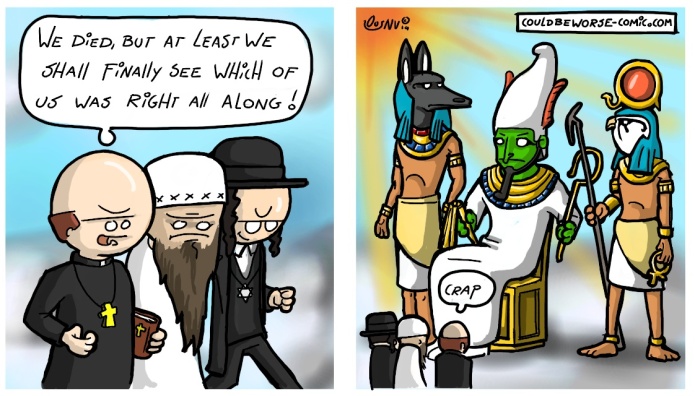
Pascal’s wager, which, in its simplified form is essentially, why not be a believer, to hedge your bets that non-belief can lead to consequences in the afterlife. The biggest argument against this dilemma is, “what if you choose the wrong belief?”
There are many reasons people believe in a specific religion, among them are those in the lack of choice category (raised in it, state sanctioned religion, etc.), and those that are have/had a choice (study, through proselytizing, etc.). For those in the first category, it is especially difficult for them to see any other belief as a valid religion, and for those in the second category, either it’s a situation of ‘right place at the right time’, or they have studied a set of choices and decided that one fits their position better than others.
This brings me to the point, or “the blind taste test.” There is a similarity to blind taste tests done by companies like coke or pepsi. In the case of being raised in a religion, you more often than not, don’t know better, nothing else has been tried. In the case of choice, you’ve at least decided between more than one choice. It’s still a blind taste test though, since, if for the sake of argument there is a god who is judging based on you being the right kind of believer, you might have chosen incorrectly. And in this case, you have to wait all the way until the end to find out if your choice was the better choice.
I hear all sorts of reasons from believers as to why their choice is the correct one. Nearly 100% of the reasons go back to doctrine (Bible, Koran, Torah, Book of Mormon, etc.) as their proof, yet those using the same texts, get a different taste test result, as an example Catholics and Baptists. In fact, current estimates of different Christian religions are estimated in the range of 43,000. In the case of Christian religious exclusivism, these are poor odds, even for Vegas.
Even if we just separate it down into the major players (Christianity, Judaism, Hinduism, Buddhism, and Islam), you’re looking at 5 choices, which isn’t bad odds in Vegas, but when betting your afterlife, do you really want to get stuck with a 1 in 5 chance of consequences? Based on current numbers, if the correct choice isn’t Christianity, then at least 31.5% of people are destined for afterlife consequences.
Are you sure your choice is correct? Sure enough to bet your afterlife?
Oh well, at least the coke vs. pepsi taste test isn’t eternal.